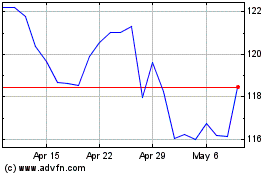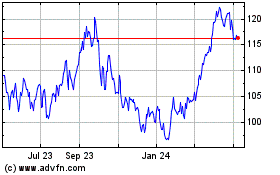U.S. Chamber of Commerce Opposes Provisions In Oil-Tax Bill
May 16 2011 - 4:34PM
Dow Jones News
The U.S. Chamber of Commerce on Monday called a proposal to
repeal tax breaks for five major oil and gas companies "misguided"
and said that such a move could result in higher energy prices. The
Chamber of Commerce's objection helps to solidify Senate Republican
opposition to the bill.
In a letter sent to members of the U.S. Senate, the Chamber of
Commerce, a trade group representing U.S. businesses, said
legislation proposed by Sen. Robert Menendez (D., N.J.) unfairly
targeted a single industry and could be counterproductive.
"Levying new taxes and fees on America's oil and gas industry
would increase U.S. dependence on foreign oil, increase costs to
consumers, jeopardize U.S. jobs and erode economic
competitiveness," wrote R. Bruce Josten, the Chamber's executive
vice president of government affairs.
The Senate is expected to take up the oil-tax bill for vote on
Wednesday. Introduced last week by Menendez and other Senate
Democrats, the bill would eliminate about $2 billion a year in tax
breaks for five major oil companies, including Royal Dutch Shell
PLC's (RDSA) Shell Oil Co., Chevron Corp. (CVX), Exxon Mobil Corp.
(XOM) and use the revenue to pay down the federal deficit.
The bill would repeal a deduction for domestic manufacturing
activity and tighten the way oil companies get credit for paying
foreign taxes, among other provisions. The bill is not expected to
pass the Senate due to opposition by Republicans and conservative
Democrats, but could play a role in shaping the debate on how to
reduce the size of the U.S. budget deficit.
The Chamber objected to repealing the manufacturing deduction,
saying the change "could discourage energy investment, result in
lost jobs and ultimately decrease supply and increase energy costs
for businesses relying on oil and gas."
However, other agencies have estimated that the provisions would
be unlikely to affect the cost of U.S. gasoline. "The price of oil
is determined on world markets and tends not to be sensitive to
small cost variations experienced in regional production areas,"
the Congressional Research Service said last week in a memorandum
to Senate Majority Leader Harry Reid (D., Nev.)
The bill is not expected to pass the Senate, but could play a
role in shaping the debate on how to reduce the size of the U.S.
budget deficit.
-By Kristina Peterson, Dow Jones Newswires; 202-862-9244;
Kristina.peterson@dowjones.com
--Tennille Tracy and Siobhan Hughes contributed to this
article.
Exxon Mobil (NYSE:XOM)
Historical Stock Chart
From Mar 2024 to Apr 2024

Exxon Mobil (NYSE:XOM)
Historical Stock Chart
From Apr 2023 to Apr 2024
